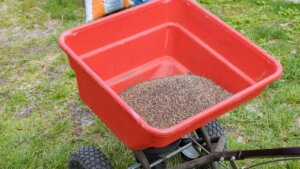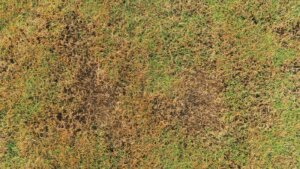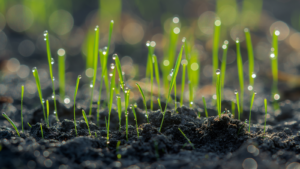Have you ever stumbled upon an old bag of grass seed in your shed and wondered, “Is this still good to use?” You’re not alone. The question of whether grass seed expires is a common one among garden enthusiasts and homeowners alike. This article dives deep into the world of grass seed, shedding light on its shelf life, storage practices, and how to ensure your lawn remains a lush, vibrant oasis.
Key Insights
- The Crucial Role of Storage: Discover how proper storage can significantly extend the viability of your grass seed.
- Viability Over Time: Learn how the age and quality of the seed affect its ability to sprout and sustain a healthy lawn.
- When to Opt for Fresh Seed: Understand the scenarios where investing in new grass seed is essential for your lawn’s health and aesthetics.
- Technological Advances in Seed: Explore how recent advancements in grass seed technology can benefit your lawn care routine.
Armed with this knowledge, you’ll be equipped to make informed decisions about using old seeds, storing new ones, and when to invest in fresh seed for optimal lawn health. Let’s delve into the intricacies of grass seed viability and uncover the best practices for storing and using your seed to achieve a lush, vibrant lawn.
Store Grass Seed: Ensuring Longevity and Viability
The Importance of Proper Storage
Proper storage is crucial for maintaining the germination rate and overall viability of your grass seed. To prevent your grass seed from going bad, consider these storage tips:
- Cool, Dry Places: Keep the seed away from direct sunlight to avoid degradation.
- Sealed Containers: Protect your seed from humidity and pests, ensuring it remains viable for as long as possible.
- Well-Ventilated Areas: A good airflow prevents moisture buildup, a common cause of seed spoilage.
Incorporating these practices ensures your grass seed remains viable, addressing many homeowners’ concerns about the longevity of their lawn investments.
Innovative Storage Solutions
To extend the shelf life of your grass seed beyond traditional methods:
- Silica Gel Packets: Place these within storage containers to absorb unwanted moisture, a simple yet effective way to keep your seed dry.
- Temperature-Controlled Environments: A basement or climate-controlled garage can offer the ideal conditions for seed storage, safeguarding against extreme temperature fluctuations.
These innovative solutions can significantly enhance seed longevity, helping to prevent your grass seed from expiring prematurely.
Viability and Seed Viability: Maximizing Your Lawn’s Potential
Understanding Seed Viability
The ability of grass seed to germinate and produce a healthy plant is influenced by several factors:
- Seed Age: Older grass seed may have a lower germination rate, affecting the health of your lawn.
- Storage Conditions: Seeds stored improperly can lose viability faster, leading to lawn problems.
- Seed Quality: High-quality seeds, especially varieties like perennial ryegrass and tall fescue, tend to remain viable longer, even up to three to five years if stored properly.
Understanding these factors is essential for maintaining the viability of your grass seed and ensuring a vibrant lawn.
Advanced Germination Techniques
To assess the viability of your grass seed and ensure it’s still good for planting:
- Germination Test: Place 10 seeds on a damp paper towel, roll it up, and keep it in a plastic bag in a warm area. After a week, check how many seeds sprout to gauge viability.
- Soil Temperature Kits: These kits can help you determine if your planting environment is suitable for seed germination, crucial for both new lawn seeding and overseeding projects.
Employing these techniques can help you decide whether your old grass seed is still viable or if it’s time to invest in new seed, ultimately contributing to the health and aesthetics of your entire lawn.
Use Fresh Grass Seed: When New Seed is Essential
The Benefits of Fresh Seed
Utilizing fresh grass seed is crucial for optimal lawn care, particularly in these scenarios:
- Starting a New Lawn: Fresh seed, with its high germination rate, is essential for quickly establishing a robust new lawn. This ensures that the grass seed can still germinate effectively, providing a dense, healthy lawn from the start.
- Overseeding: For addressing bare spots or enhancing lawn density, fresh seed offers the best success rate. It’s particularly important when older seed may not provide the desired coverage or health boost to your lawn.
Environmental Considerations
Choosing fresh seed not only benefits your lawn but also the environment by:
- Reducing Waste: By using seed with a higher likelihood of success, you minimize the amount of seed and resources wasted.
- Resource Efficiency: Fresh seed aligns with sustainable practices, ensuring that every seed counts towards a greener, more vibrant lawn.
Grass Seed Last: Navigating the Shelf Life of Your Seed
Shelf Life Insights
Understanding the shelf life of grass seed is key to maintaining its viability:
- Type of Grass Seed:
- Cool-season grasses, like Kentucky bluegrass and fescue, may remain viable for up to 5 years.
- Warm-season grasses typically have a shorter shelf life, reflecting their different growth habits.
- Storage Conditions: Properly stored seeds in cool, dry places away from direct sunlight can remain viable for several years, making it less likely for the grass seed to go bad prematurely.
Seed Quality and Selection
Selecting the right seed is pivotal for lawn care success:
- High-Quality Seed: Opt for seeds with a high germination rate and those well-suited to your climate. This ensures the seed’s ability to germinate remains strong, even if stored for two to three years.
- Reputable Sources: Purchasing from reputable sources guarantees seed quality, increasing the chances of a lush lawn. Many homeowners have found that investing in quality seed from the start can save time and resources in the long run.
By understanding these aspects, you can ensure your grass seed remains viable for as long as possible, supporting the health and beauty of your lawn. Whether you’re planting new grass seed or assessing the viability of stored seed, these insights will guide you in making informed decisions for a thriving lawn.
Embracing New Seed Technology for a Lush Lawn
Technological Advancements
The world of lawn care is constantly evolving, with recent advancements in grass seed technology leading the charge towards creating more resilient and vibrant lawns. Coated seeds, for example, are designed to enhance moisture retention and protect the seed during critical early growth stages, significantly improving germination rates. Genetically modified varieties have been developed to withstand harsh conditions, such as drought and disease, better than ever before. These innovations not only contribute to the overall health of your lawn but also reduce the likelihood of grass seed going bad before it even has a chance to sprout.
The Role of Professional Lawn Care Services
Navigating the myriad of options in grass seed technology can be daunting for many homeowners. This is where professional lawn care services come into play. With their finger on the pulse of the latest developments in seed technology, these experts can offer invaluable advice tailored to the specific needs of your lawn. Whether it’s selecting the right type of seed to withstand your local climate or determining the best time to plant, professional services ensure that your lawn receives the care it needs to thrive. By leveraging their expertise, you can avoid common pitfalls such as using unopened grass seed that has surpassed its expiration date or improperly storing your seed, both of which can compromise the viability of your grass seed.
For any lawn-related inquiries or to learn more about how we can assist you in achieving the perfect lawn, don’t hesitate to contact us via our website at Terra Lawn Care Specialists or call us directly at 610-275-2170. Let us help you navigate the complexities of lawn care, ensuring your lawn remains a source of pride and joy for years to come.



